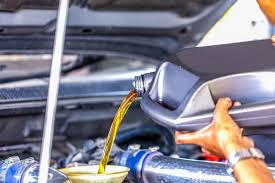Introduction
Have you ever wondered what would happen if you skipped that oil change appointment? Maybe you thought it was not a big deal or could wait a little longer. Well, you’re not alone. Many car owners overlook the importance of regular oil changes, but this simple maintenance task is vital for your vehicle’s health. Let’s dive into why changing your oil is so crucial and what happens if you don’t.
What is Engine Oil?
Engine oil is essential for your car’s health. It’s a lubricant made from base oils enhanced with various additives to improve its performance. There are several types of engine oil, including conventional, synthetic, and high-mileage oil, each designed to meet specific engine needs.
Understanding the Vital Role of Engine Oil
Lubrication
The primary job of engine oil is to lubricate the moving parts of the engine, reducing friction and preventing parts from wearing out too quickly.
Cooling
Oil acts as a coolant, carrying away heat to prevent engine damage.
Cleaning
As oil circulates, it picks up dirt, debris, and other contaminants, keeping the engine clean.
Sealing
Oil forms a seal between the pistons, rings, and cylinder walls, which helps maintain compression and improve efficiency.

Why Regular Oil Changes Are Crucial
Maintaining Engine Performance
Regular oil changes ensure that your engine runs smoothly and efficiently, avoiding performance issues.
Enhancing Fuel Efficiency
Clean oil reduces friction, which can improve your car’s fuel efficiency.
Prolonging Engine Life
By preventing excessive engine wear, regular oil changes can dramatically extend your engine’s life.
Immediate Consequences of Skipping Oil Changes
Increased Engine Wear and Tear
Without fresh oil, the engine parts don’t get the lubrication they need, leading to increased wear.
Overheating Issues
Old oil can’t absorb heat effectively, causing your engine to overheat.
Decreased Performance
You might notice a drop in your car’s performance, including slower acceleration and rough idling.

Long-Term Effects of Not Changing Your Oil
Engine Sludge Buildup
Over time, dirty oil turns into sludge, clogging your engine and reducing its efficiency.
Reduced Lifespan of the Engine
Constant neglect can lead to significant engine damage, shortening its lifespan.
Potential for Complete Engine Failure
In the worst-case scenario, your engine could seize up completely, leading to costly repairs or even the need for a new engine.
Signs Your Car Needs an Oil Change
Dashboard Oil Light
If your oil light comes on, it’s a clear sign that you need to check your oil levels.
Unusual Engine Noises
Knocking or ticking sounds from your engine might indicate insufficient lubrication.
Dark and Dirty Oil
Fresh oil is amber-colored; if your oil is dark and dirty, it’s time for a change.
Exhaust Smoke
Excessive smoke from the exhaust can signal oil problems.

What Happens Inside Your Engine When You Skip Oil Changes
Increased Friction
Without proper lubrication, friction between moving parts increases, causing damage.
Component Damage
Parts like pistons and bearings can suffer severe damage without the protective layer of oil.
Contaminant Buildup
Without regular oil changes, contaminants can accumulate, leading to blockages and reduced efficiency.
Common Myths About Oil Changes
“I Can Just Top Off the Oil”
Topping off the oil isn’t a substitute for changing it. You need to replace the old, contaminated oil entirely.
“Modern Engines Don’t Need Frequent Oil Changes”
Even modern engines require regular oil changes to maintain performance and longevity.
“Synthetic Oil Lasts Forever”
While synthetic oil does last longer, it still needs to be changed according to the manufacturer’s recommendations.
How Often Should You Change Your Oil?
Manufacturer Recommendations
Always follow your vehicle manufacturer’s guidelines for oil change intervals.
Factors Influencing Oil Change Frequency
Driving conditions, engine type, and oil quality can all affect how often you need to change your oil.
DIY Oil Change vs. Professional Service
Pros and Cons of DIY
Changing your oil yourself can save money, but it requires time and the right tools.
Benefits of Professional Service
Professionals can spot other potential issues during an oil change and ensure everything is done correctly.
The Cost of Oil Changes vs. Engine Repair
Comparing Costs
An oil change is a small investment compared to the high cost of major engine repairs.
Long-Term Savings
Regular maintenance can save you money in the long run by preventing expensive repairs.
Preventive Maintenance Tips
Regular Oil Checks
Check your oil level regularly to ensure it’s within the proper range.
Keeping Up with the Maintenance Schedule
Follow your car’s maintenance schedule to keep everything running smoothly.
Using the Right Type of Oil
Always use the type of oil recommended by your vehicle manufacturer.

Case Studies and Real-Life Examples
Stories of Engine Damage Due to Neglected Oil Changes
Many drivers have faced costly repairs due to neglecting oil changes. These stories serve as a warning to stay on top of maintenance.
Positive Outcomes from Regular Maintenance
Conversely, regular maintenance has helped many car owners avoid major issues and keep their vehicles running longer.
Conclusion
Skipping oil changes might seem like a minor thing, but it can lead to significant problems down the road. From increased engine wear to potential engine failure, the risks are too high to ignore. Regular oil changes are a simple, cost-effective way to optimize your car’s performance and longevity. So, next time you’re tempted to skip that oil change, remember what’s at stake.
FAQs
How often should I change my car’s oil?
Most manufacturers recommend changing your oil every 3,000 to 5,000 miles, but this can vary based on your car and driving habits.
Can I drive my car if the oil change light is on?
It’s best to address the oil change light immediately. Driving with this light on can cause serious engine damage.
What type of oil is best for my car?
Refer to your vehicle’s owner manual for the recommended oil type. Factors include engine type and driving conditions.
What should I do if I suspect engine damage?
If you suspect engine damage, it’s crucial to have your car inspected by a professional mechanic as soon as possible.
Is synthetic oil better than regular oil?
Synthetic oil offers better performance and protection, especially in extreme temperatures, but it’s essential to follow your manufacturer’s recommendations.










